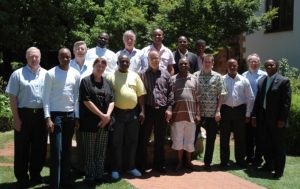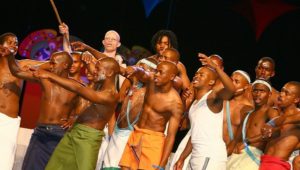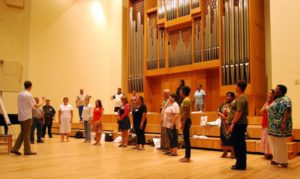How Choral Organizations in Africa Have Met With Success and Dealt with Failure
By Rudolf de Beer, Choral Conductor and Teacher
Introduction
The western trend to arrange entities under umbrella organisations for managerial reasons has established itself in just about every society the world over. In the so-called choral world many local, regional, national and international organisations currently organise festivals, competitions, seminars, symposia as well as other related events. Calling themselves organisation, federation, or even society (a term originally used for larger amateur choral groups), these entities remain the driving force for larger choral events in the world and exhibit various degrees of success.
In keeping with this international drift, many recent efforts have been aimed at founding national choral organisations on the African continent. I had the fortunate opportunity to be part of two such projects in South Africa, initiated by Kåre Hanken from the Norwegian Choir Association, and the International Federation for Choral Music (IFCM). These attempts, like the newly formed Choral Institute of South Africa (Chorisa), naturally run into problems when politicians wish to control any national initiatives. This ideological misconception explains perhaps the many political difficulties this continent has – the direct result of groups or individuals being driven by either financial goals or the wish to gain control, as opposed to the goal of fulfilling the cause in question. Other drawbacks include lack of managerial capabilities, financial skills, and communication strategies, including lack of technical infrastructure.

Successful IFCM initiatives in Africa were, however, highlighted during the Barcelona meeting of the Board and Advisors in 2010, although it became clear that current undertakings then and future projects need driving forces, i.e. individuals or groups of people. African Children Sing is a spin-off project of the Winneba Children’s Choir which, according to Edusei Derkyi, “formed the nucleus of the first ACS camp” while Conductors without Borders is successfully driven by Thierry Thiébaut in most of the French-speaking African countries. Amongst others, the Togolese and Congolese Federations for Choral Music were established with the assistance of this project and individuals from A Coeur Joie International[2] especially, who committed much of their time and energy to forming appropriate administrative structures.
Any organisation must learn not to re-invent the wheel time and again, and look at the work of other similar organisations. Here, IFCM, A Coeur Joie International, and other national choir organisations such as Fundación Schola Cantorum de Venezuela, can help.
The present article highlights factors that positively or negatively effect the founding of such organisations, and suggests how prospective choral organisations in Africa might overcome such problems. However, if these recommendations are based only on practical suggestions without reference to some ideological dangers, most of these efforts may one again fail.
Rationales for the existence of choral organisations
A golden thread that binds most choir organisations together is the promotion of choral music and education that takes place within the field. These entities thus strive to improve choral performance in the world. The mission statements of some of the biggest choral organisations in the world are proof of this. The central purpose of the American Choral Directors Association is to “promote excellence in choral music through performance, composition, publication, research, and teaching whilst striving through arts advocacy to elevate choral music’s position in American society”.[3] The Japan Choral Association “aims to popularize choral music and improve its level, the fostering and leading of choral groups, and the development of musical culture”.[4] Most organisations reach these goals through events such as symposia or seminars, festivals or competitions, or meetings that promote singing, education or discussion. An organisation that does not provide such activities for its members will, then, struggle to survive.
Numerous choirs are active in Africa, but choral music activities remain based on choir competitions or festivals where performances are rated through adjudication. Most choral organisations – such as the currently dormant South African Choral Society – actually provide the organisational structure for some of these events, although this institution is busy dying a slow death because of political ideologies in a country where organisations from the pre-democratic era still suffer from victimisation or individual power struggles. There remain few choral organisations in Africa that succeed in providing activities other than competitions or festivals, although a religious organisation, the Association of Ghana Choral Musicians, was “formed to bring together all Ghana choral musicians so as to foster unity amongst them and promote choral music in Ghana”.[5]
The need for larger choral events prompted financial, governmental, religious and touristic institutions to organise one-off festivals, competitions and choral educational activities. The Manda Wilderness Choir Festival, based in Cobue, Mozambique, organises events to train choral musicians as part of an initiative by the Nkwichi Lodge in northern Mozambique, which itself aims at promoting tourism in this region.[6] The South African Schools Choral Eisteddfod is one of the school enrichment programmes coordinated by the Department of Education[7], and the Old Mutual National Choir Festival is “South Africa’s oldest and most prestigious choral music competition”.[8] The Inter-Denominational Spiritual Choir Association[9] in Malawi and the Apostolic Music Festival[10] of 2010 in Zimbabwe are organised by church denominations.

Even individual choirs, universities, or larger general music festivals organise events to provide choral musicians with opportunities to learn and share. The Huruma Rainbow Singers organised “the 1st National Choral Festival in Tanzania”,[12] while the division for choral conducting at Stellenbosch University in South Africa held an international choral symposium in cooperation with the IFCM’s Voices of South Africa, followed by two annual seminars. The Kenya Music Festival is an annual event held between May and October[13] and remains one of the biggest music festivals on the continent to host large choral events.

Events and efforts discussed so far aim to promote choral music and education within this discipline. Where these noble guidelines are the regulatory factors, the organisation will usually remain sustainable, although on the African continent many other factors also influence the organisational and managerial structures.
The role of IFCM in removing obstacles
On a continent where the ideology of democracy is not yet engrained in the culture of most citizens, politicians often aim to control non-governmental enterprises and often block such initiatives. Furthermore, a lack of knowledge, availability of and or access to technology, as well as poor infrastructure, all serve to impede communication – a key factor in running organisations. Economic constraints also hinder organisational structures. Many other obstacles in the choral world itself may be found along the road to the smooth running of many an organisation.
Where focus changes and individual ideologies, personal gain or political agendas are promoted, choral organisations either become defunct or non-functional. So much is fact. Large umbrella organisations also suffer because individuals are also key members of smaller organisations, leading to conflicts of interest. Bigger organisations might thus claim credit for successes of member organisations without having offered assistance in these ventures. Many choirs also do not want to be part of organisations where the main goal is education rather than competition.
Included in the purposes of the IFCM are the aims to “strengthen cooperation between national and international organisations and individuals interested in all aspects of choral music”, and to “encourage the formation of choral organizations in countries and regions where none exist”.[15] As an organisation, IFCM should in the first instance provide for its members; it is a not-for-profit entity and cannot assist financially in the establishment of these goals. The value of moral, managerial and educative support should not be underestimated however. This particular organisation’s successes relate directly to efforts by individual and institutional members. And these key factors must play a role in the establishment of new organisations or projects, especially on the African continent. Regular communication will enhance these efforts, although most singers in Africa earn their living from non-musical professions, which helps explain why organisations, choirs and institutions have found it difficult to gain ground at home.
On a continent where the struggle to survive overshadows any non-essential activity, success stories like IFCM founding member A Coeur Joie International from France demonstrate how choral communities in Africa could strengthen their profiles with new organisational structures, ones which would promote choral music through better communication, education and, most importantly, choral singing itself.
[1] Photo by Kåre Hanken
[2] http://www.acoeurjoie.com/contenu/coeur-joie-international
[4] http://www.jcanet.or.jp/inter/JCA_guide.html
[5] https://www.facebook.com/login.php?login
[6] http://www.justgiving.com/fionaellischoir & http://www.justgiving.com/mandawct
[7] Department of Basic Education South Africa 2010 South African Schools Choral Eisteddfod Participation Rules
[8] http://www.oldmutual.co.za/about-us/sponsorship/arts-and-lifestyle/national-choir-festival.aspx
[9] http://www.malawi-invest.net/cont_ngo_list.html
[10] http://allafrica.com/stories/201003090035.html
[11] http://www.oldmutual.co.za/documents/NationalChoirFestival/Wallpapers/1280×1024/wallpaper_06.jpg
[12] http://hrs.yolasite.com/projects.php
[13] Porter, J. 2011 The Sound of Music in Kenya. Yale-New Haven Teachers Institute: http://www.yale.edu/ynhti/curriculum/units/2000/5/00.05.07.x.html
[14] Private collection of photos from the First Stellenbosch International Choral Conducting Symposium & Voices of South Africa 2009
[15] http://ifcm.net/index.php?m=7
Edited by Graham Lack, Germany